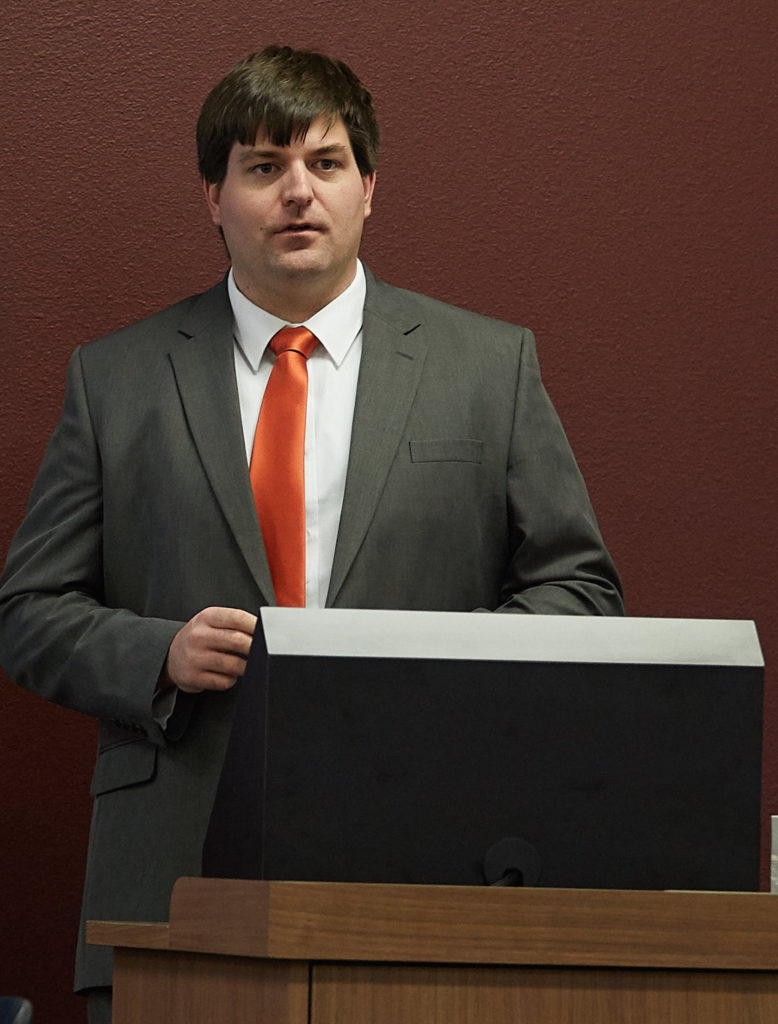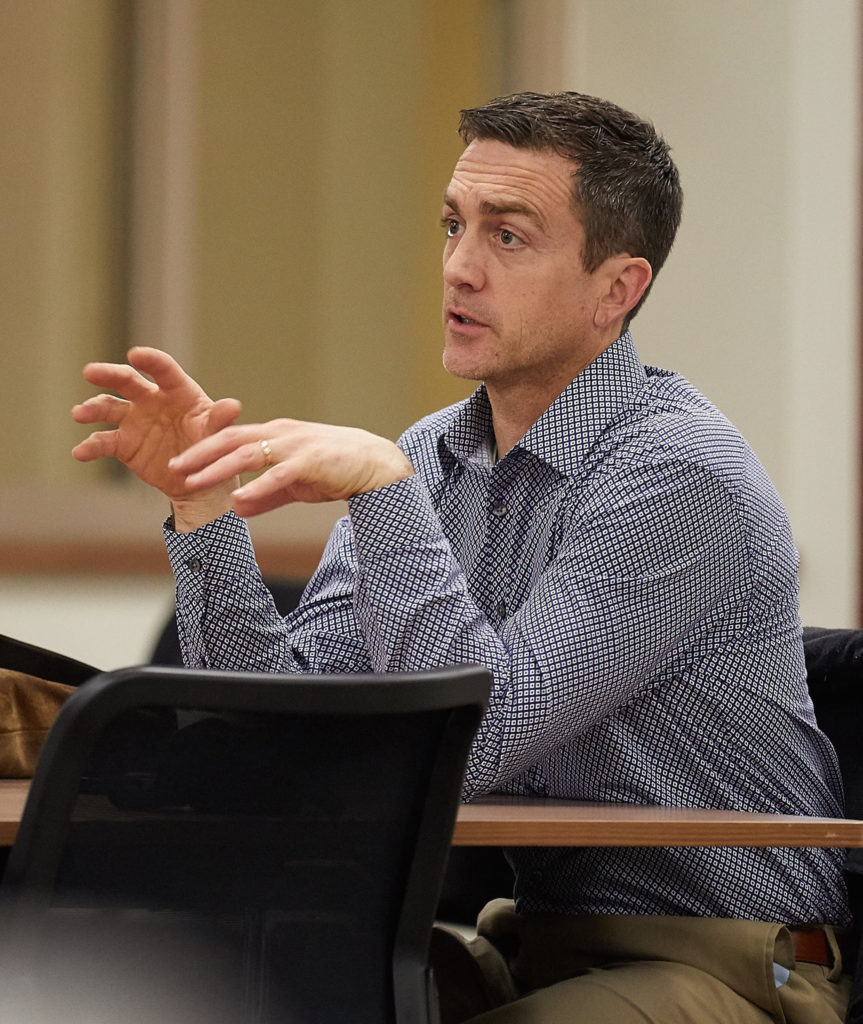Posted 2:10 p.m. Thursday, Dec. 21, 2017

Class considers what city should do with $1 million in economic development funds.
Class considers what city should do with $1 million in economic development funds
It’s not uncommon to think about what to do with $1 million. A UW-La Crosse economics class didn’t only ponder it, they drew up detailed plans on spending the sum and delivered them to city leaders at the end of spring semester. Associate Professor of Economics Adam Hoffer’s Modern Political Economy course partnered with the City of La Crosse to develop plans for how to best spend one-time, economic development funding of $1million. The city expects to have the funds beginning in 2018 from a land sale. Students presented their projects to city and county representatives Tuesday, Dec. 12, in UWL’s Murphy Library. [caption id="attachment_50648" align="alignleft" width="325"] Associate Professor of Economics Adam Hoffer during the Tuesday, Dec. 12, class presentations to city and county government officials.[/caption]
Hoffer brought the project idea up to a city council member after learning about the funding. Although the city was open to hearing the student ideas, there is no guarantee any one project will be selected.
Either way, developing the plans fit well with Hoffer’s class goals. In the class, students are asked to think about the role local governments can play in creating a better environment for economic growth. Through the city proposals, students were challenged to use research and a review of scientific literature to develop sound proposals based on previous policy that has worked.
“It’s remarkable how much science is out there on a lot of these issues that is under read by the policymakers when it comes to setting policy,” says Hoffer.
Many students were also creating a budget for a large-scale project for the first time.
“It’s one thing to have an idea, but it’s another to plan the logistics and fit it into a budget,” says Hoffer.
UWL economics student Casey Nicewander developed his project idea based on his personal experience searching for a home to purchase on La Crosse’s north side. At the time, he realized the increased cost of homeowner’s insurance by living in a floodplain. His project is about finding a more natural, and lower cost way to prevent flooding on this side of the city, which would ultimately save homeowners money. Through research, he found studies based in other Wisconsin cities that pointed to the use of high absorption plants to significantly reduce flooding. His plan calls for plotting spaces for these plants and other grasses to help absorb flood waters on the north side.
Nicewander says the project has challenged him to take an insider’s view on public policy and consider all the steps to make changes.
“This does not feel like a class project or a final, but going through the steps of making something like this actually happen,” says Nicewander.
[caption id="attachment_50653" align="alignright" width="350"]
Associate Professor of Economics Adam Hoffer during the Tuesday, Dec. 12, class presentations to city and county government officials.[/caption]
Hoffer brought the project idea up to a city council member after learning about the funding. Although the city was open to hearing the student ideas, there is no guarantee any one project will be selected.
Either way, developing the plans fit well with Hoffer’s class goals. In the class, students are asked to think about the role local governments can play in creating a better environment for economic growth. Through the city proposals, students were challenged to use research and a review of scientific literature to develop sound proposals based on previous policy that has worked.
“It’s remarkable how much science is out there on a lot of these issues that is under read by the policymakers when it comes to setting policy,” says Hoffer.
Many students were also creating a budget for a large-scale project for the first time.
“It’s one thing to have an idea, but it’s another to plan the logistics and fit it into a budget,” says Hoffer.
UWL economics student Casey Nicewander developed his project idea based on his personal experience searching for a home to purchase on La Crosse’s north side. At the time, he realized the increased cost of homeowner’s insurance by living in a floodplain. His project is about finding a more natural, and lower cost way to prevent flooding on this side of the city, which would ultimately save homeowners money. Through research, he found studies based in other Wisconsin cities that pointed to the use of high absorption plants to significantly reduce flooding. His plan calls for plotting spaces for these plants and other grasses to help absorb flood waters on the north side.
Nicewander says the project has challenged him to take an insider’s view on public policy and consider all the steps to make changes.
“This does not feel like a class project or a final, but going through the steps of making something like this actually happen,” says Nicewander.
[caption id="attachment_50653" align="alignright" width="350"] Karl Green, UW Extension’s La Crosse County agent, asks a question during the presentations.[/caption]
Wesley Herried, an economics and organizational and professional communications major, looked at several long-term challenges for the city, including declining property values, high property taxes and decreasing school enrollment. His proposal focuses on building more income-based housing for La Crosse’s elderly population to mitigate these issues. The move would provide opportunities for seniors who have difficulty managing a home to sell while freeing up homes for young professionals, laborers and families to move in, he says. Herried says the project has given him real-world experience and something to share with future employers.
“Working with a real client makes it real and makes you care way more about it,” says Nicewander.
Hoffer says the project gets students more engaged in the classroom and in the community.
Karl Green, UW Extension’s La Crosse County agent, asks a question during the presentations.[/caption]
Wesley Herried, an economics and organizational and professional communications major, looked at several long-term challenges for the city, including declining property values, high property taxes and decreasing school enrollment. His proposal focuses on building more income-based housing for La Crosse’s elderly population to mitigate these issues. The move would provide opportunities for seniors who have difficulty managing a home to sell while freeing up homes for young professionals, laborers and families to move in, he says. Herried says the project has given him real-world experience and something to share with future employers.
“Working with a real client makes it real and makes you care way more about it,” says Nicewander.
Hoffer says the project gets students more engaged in the classroom and in the community.
